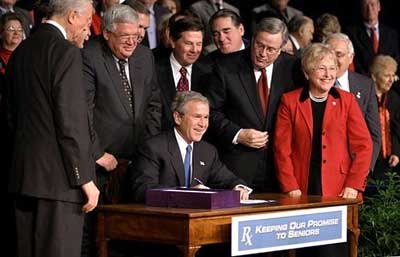
| President George W. Bush signs H. R. 1, the Medicare Prescription Drug, Improvement and Modernization Act of 2003, at Constitution Hall in Washington, D.C., Dec. 8, 2003. "With this law, we are providing more access to comprehensive exams, disease screenings, and other preventative care, so that seniors across this land can live better and healthier lives," said President Bush. White House photo by Paul Morse |
The President's Health Care Accomplishments
- All seniors will be guaranteed access to affordable prescription
drug coverage under Medicare. In December 2003, President Bush signed
into law legislation that will make Medicare prescription drug coverage
available to 40 million seniors and people with disabilities. The new
benefit will become available on January 1, 2006. Beginning in June
2004, beneficiaries will have access to Medicare-approved prescription
drug discount cards, which will save them 10 -- 25 percent off the retail
price of most prescription drugs. Low-income beneficiaries also will
receive $600 to help them purchase their medicines.
- All seniors will have more choices and better benefits under a
strengthened and improved Medicare program. In addition to helping
seniors afford their prescriptions, the legislation the President signed
enhances basic Medicare coverage by providing better preventive care
and disease management services. Beginning in 2006, seniors also will
get the same kinds of choices the Members of Congress and federal employees
have to select the coverage that is best for them, including the choice
of keeping their Medicare coverage just the way it is.
- Millions of low-income Americans made eligible for coverage.
Since January 2001, the Department of Health and Human Services has
helped states extend coverage to an estimated 2.6 million low-income
Americans eligible under Medicaid and the State Child Health Insurance
Program (SCHIP) by granting states waivers and approving state plan
amendments.
- Vulnerable populations who live in medically underserved areas
have gained greater access to medical services. To fulfill a commitment
to create 1,200 new and expanded health center sites to serve an additional
6.1 million people by 2006, the President has dramatically increased
funding to commit health centers to help individuals that live in underserved
and rural areas, including many people that are uninsured, low income
individuals, migrant farm workers, homeless individuals, and children.
As part of the Medicare act, the President also signed into law a provision
that authorizes $1 billion to compensate hospitals for the cost of providing
emergency medical care to undocumented aliens.
- Federal funding of state high-risk pools will make health insurance
coverage more affordable to individuals with serious medical conditions.
Many Americans with pre-existing medical conditions have difficulty
finding insurance coverage. Others have policies available, but can't
afford the premiums. High risk pools in 30 states make coverage available
and more affordable to these individuals. In December 2002, President
Bush signed into law legislation that will make $100 million available
to states to establish and support high-risk pools. Some $40 million
in federal funds will be awarded to states this year to help subsidize
these pools, with the first set of grants expected to be issued by HHS
later this month.
- Doubling the budget of the National Institutes of Health will
lead to better health care for all Americans. President Bush fulfilled
a commitment by completing the historic doubling of the NIH budget by
2003, dramatically increasing medical research funded by NIH to speed
cures and treatments for the diseases that plague our nation and the
world.
- Increased funding for biodefense preparedness is strengthening
our homeland security and improving public health surveillance.
The President has provided nearly $4.5 billion to states, local governments
and hospitals for a bioterrorist attack. Enhancements to public health
surveillance improve our capacity in the area of detecting and responding
to all human illnesses and outbreaks of disease.
|
 |
 |
 |
|
 |
 |




